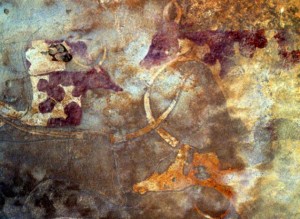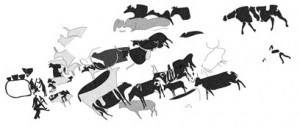By Tom Westcott.
London, 27 June:

British scientists have found evidence from ancient pottery fragments that Libyans were fermenting milk into yoghurt . . .[restrict]7,000 years ago.
Pottery shards dating from 5200 to 3000 BC, excavated from the Takarkori rock shelter in southwestern Libya’s Acacus mountains, have revealed that ancient Libyans were fermenting dairy products to make them more digestible to the human stomach.
British scientists have found evidence from ancient pottery fragments that Libyans were fermenting milk into yoghurt 7,000 years ago.
Pottery shards dating from 5200 to 3000 BC, excavated from the Takarkori rock shelter in southwestern Libya’s Acacus mountains, have revealed that ancient Libyans were fermenting dairy products to make them more digestible to the human stomach.
Traces of fat on the unglazed ceramic fragments show how people in the region may have evolved to tolerate milk. Prehistoric man is thought to have been intolerant to lactose, a sugar found in milk, but the fermentation processes, such as making yoghurt, lower the lactose content of milk.
Biomolecular archaeologist Professor Richard Evershed, who led a team from the University of Bristol in the United Kingdom in the research, said: “They could have consumed milk but it might have made them a little poorly. Perhaps they were processing the milk to lower the lactose content.”
Evershed and archaeological scientist Julie Dunne worked with Savino Di Lernia, from the Sapienza University of Rome, on samples excavated from the Acacus mountains between 2003 and 2006.

The team analysed ground-up samples taken from 81 pottery shards from the rock shelter using mass spectrometry to identify residues embedded in the pots to see what they once contained. The unglazed crockery used by prehistoric man absorbed traces of the foodstuffs they once held, and these included plant oils and animal fats.
Evershed and Dunne’s team found that animal fats were the most common, and dairy products in particular. Dunne said that the investigations showed that prehistoric man in Libya was consuming processed dairy products, adding: “We can’t tell whether it was butter, cheese or yoghurt, but we can tell they were processing it in the pots.”
The Takarkori rock shelter is one of several in the area that contains ancient rock art depicting domesticated cattle, including images of people milking cows. It is now in the Sahara desert but 7,000 years ago the shelter lay in a green and verdant area capable of sustaining herds of cattle.
Rock paintings and animal bones have long offered evidence of the domestication of cattle but are hard to accurately date and do not show whether the cattle were kept for meat or dairy. This new evidence is an important piece in the puzzle of how humans evolved to build up tolerance to lactose and how dairy products became part of the daily diet of prehistoric man.
In a statement, Dune said: “We already know how important dairy products such as milk, cheese, yoghurt and butter, which can be repeatedly extracted from an animal throughout its lifetime, were to people of Neolithic Europe, so it’s exciting to find proof that they were also significant in the lives of the prehistoric people of Africa.”
The faint Takarkori rock paintings may however be in danger, according to a tourist who visited the site a few years ago. She recalls that the local guide helped the group of visitors see the paintings better by throwing water over them. [/restrict]









